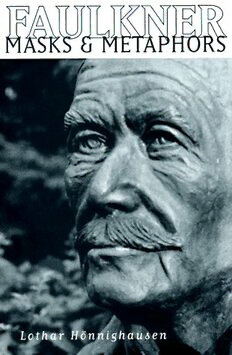Download Faulkner: masks and metaphors PDF Free - Full Version
Download Faulkner: masks and metaphors by Lothar Hönnighausen in PDF format completely FREE. No registration required, no payment needed. Get instant access to this valuable resource on PDFdrive.to!
About Faulkner: masks and metaphors
that Faulkner was a "liar" not just in his writing but also in his life has troubled many critics. They have explained his numerous "false stories," particularly those about military honors he actually never earned and war wounds he never sustained, with psychopathological imposture-theories. The drawback of this approach is that it reduces and oversimplifies the complex psychological and aesthetic phenomenon of Faulkner's role-playing. Instead, this critical study by one of the most acclaimed international Faulkner scholars takes its cue from Nietzsche's concept of "truth as a mobile army of metaphors" and from Ricoeur's dynamic view of metaphor and treats the wearing of masks not as an ontological issue but as a matter of discourse. Honnighausen examines Faulkner's interviews and photographs for the fictions they perpetuate. Such Faulknerian role-playing he interprets as a mode of organizing experience and relates it to the crafting of the artist's various personae in his works. Mining metaphor as well as modern theories on social role-playing, Honnighausen examines unexplored aspects of image creation and image reception in such major Faulkner novels as The Sound and the Fury, Light in August, A Fable, and Absalom, Absalom! Lothar Honnighausen is a professor of English and director of the North American program at the University of Bonn. He is general editor of Transatlantic Perspectives and author of William Faulkner: The Art of Stylization in His Early Graphic and Literary Work.
Detailed Information
| Author: | Lothar Hönnighausen |
|---|---|
| Publication Year: | 1997 |
| ISBN: | 9780878059980 |
| Language: | English |
| File Size: | 1.047 |
| Format: | |
| Price: | FREE |
Safe & Secure Download - No registration required
Why Choose PDFdrive for Your Free Faulkner: masks and metaphors Download?
- 100% Free: No hidden fees or subscriptions required for one book every day.
- No Registration: Immediate access is available without creating accounts for one book every day.
- Safe and Secure: Clean downloads without malware or viruses
- Multiple Formats: PDF, MOBI, Mpub,... optimized for all devices
- Educational Resource: Supporting knowledge sharing and learning
Frequently Asked Questions
Is it really free to download Faulkner: masks and metaphors PDF?
Yes, on https://PDFdrive.to you can download Faulkner: masks and metaphors by Lothar Hönnighausen completely free. We don't require any payment, subscription, or registration to access this PDF file. For 3 books every day.
How can I read Faulkner: masks and metaphors on my mobile device?
After downloading Faulkner: masks and metaphors PDF, you can open it with any PDF reader app on your phone or tablet. We recommend using Adobe Acrobat Reader, Apple Books, or Google Play Books for the best reading experience.
Is this the full version of Faulkner: masks and metaphors?
Yes, this is the complete PDF version of Faulkner: masks and metaphors by Lothar Hönnighausen. You will be able to read the entire content as in the printed version without missing any pages.
Is it legal to download Faulkner: masks and metaphors PDF for free?
https://PDFdrive.to provides links to free educational resources available online. We do not store any files on our servers. Please be aware of copyright laws in your country before downloading.
The materials shared are intended for research, educational, and personal use in accordance with fair use principles.

